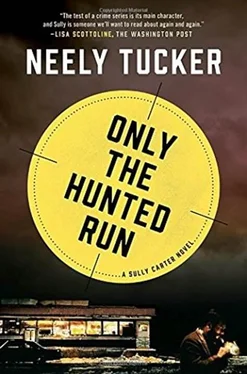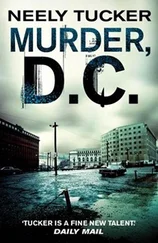Terry Waters.
He looked up at the image, frozen, to see a skinny boy with black hair, his cap jammed down on his head, the brim obscuring the top half of his face, biting his lower lip to try to keep from laughing. Leaning into Waters’s right shoulder was a slender, black-haired kid with three bats slung over his shoulder, no hat on his head, the slugger with a touch of preadolescent swag.
“George Harper,” read the caption.
Sully leaned forward, not breathing, staring at the image until it dissolved into a million tiny gray dots. The man shooting in the Capitol, lying on Mass Ave., singing in Superior Court. There was no doubt.
“I ain’t got a lot,” he whispered to the picture, tapping it with his index finger, “but, sweet pea, I got you .”
Still staring, he hollered out loud. “Hey, John Ed?”
“Whoo.”
“You know when the last flight from Tulsa goes wheels up, brother?”
“WE ABSOLUTELY CAN’Tprint it, and even if we could, I don’t know that we should,” Eddie was saying, leaning over his desk, looking down at the brittle broadsheet laid out in front of him. “It’s not enough. Not yet. I’ll give you strong facial similarities, I’ll give you circumstantial.”
“Agreed,” Sully said.
“But I can’t give you, and no one would, beyond a reasonable doubt.”
“Miriam,” said Sully.
Eddie, still leaning forward, said, “That comes pretty close. I’ll give that to you, too. But we’re still fucked.”
“No argument here.”
“This woman in the house, Elaine, the Waters’ neighbor. Do you see any way to verify her story?”
“None that I didn’t already do,” Sully said. “But for what it’s worth, I absolutely believed her. Can’t see a motive for her to lie. Like I said to R.J., on the phone out there, coming up with that story on the fly? I just don’t see it.”
Nine fifteen in the morning, Sully, bleary-eyed, sipping on black coffee with a ton of sugar, Eddie, R.J., Paul, and Melissa in Eddie’s glass-walled office, the door closed but the newsroom yet to populate for the day.
R.J. shifted in his chair, his pants up over his ankle-high socks, showing pale calf, not caring, weighing in again. “No, but we don’t have to know why. Maybe she didn’t like you. Or palefaces in general. Maybe she was drunk. Maybe she’s really Terry Waters’s aunt. Who knows. She won’t even put her name on it.”
“But,” said Eddie, “what this does do is screw us over, in at least the short term. We’re supposed to, on one hand, keep calling this guy ‘Terry Waters’ in print, while we’re thinking that’s wrong? It’s not journalistic malpractice, but it’s… troublesome.”
And then R.J. was talking about good faith, glancing over at Sully, that the paper was working in good faith, we had a lead on a story of interest and we were checking it out, as any responsible news-gathering outfit would do, verifying it before publication, the lines of due diligence being laid out, getting some air, everyone nodding.
“Okay,” Eddie said. “Okay. If, if this guy in jail is not Terry Waters but is this putz George Harper, why doesn’t law enforcement know? Wouldn’t fingerprints iron that out?”
“You don’t get fingerprinted,” Sully said, “unless you’re arrested. There’s no record Terry Waters was ever arrested.”
“What about Harper?”
“Susan, over in research, I called her last night on the way to the airport in Tulsa, and got her started on the Harper family. LexisNexis, Accurint, Accutrack. Granddad, that’s William, is probably going to be our best bet since he was in business somewhere in north Texas and was living life aboveboard. From there, we should be able to get George, his mother, other relatives, neighbors.”
Eddie let out a sigh at that and sat down. “Jesus. This guy pretends to be a dead Native American and says his dead grandmother is going to kill a D.C. Superior Court magistrate.” It was just an observation, not meant to prompt any response, but it hung over the room. Sully fighting back a headache, the lack of sleep catching up with him.
R.J., his face pinched, took his glasses off and rubbed his eyes, suddenly looking old. Paul, one of those guys at the gym at 6:15 five days a week, reading the Times on the stationary bike, looked like a million. He was writing on his legal pad, no doubt sketching out assignments for his National staff. Melissa was, for once, looking like this was something they should pursue rather than trying to convince Eddie that Sully had gone off the deep end. She sensed that Eddie was thinking, thus offering a break in the conversation for a lower editor to chip in.
“Frances, the mom?” she said. “Were you able to get anything else on her? Can we get how she died? Isn’t that what this guy is pissed about? Maybe that’s the link to Representative Edmonds.”
Sully held his hands up, hey, don’t shoot. “No. No time. I mean, I left that office out there and drove like hell for Tulsa. Left everything at the hotel. Last flight heading east was to Detroit. That connected to Minneapolis. That got me into Dulles this morning about an hour after midnight. I gave the name, though, to Susan, with George’s. She’s working it.”
“Any word on the dad?”
“None.”
She nodded. “You mind letting us in Metro chase that end? Keith is really good with records, the courts. Any leads, he’ll call them in to me. He’ll run down Frances, or, if there’s multiple possibilities, I can assign a warm body to each one. Anything to pass on, we will.”
This politeness from her, this jumping in on the effort, what did you even do with that? Whatever. The sleep deprivation was making everything blurry around the edges. “Keith’s great, sure,” he said. “This thing has too many tentacles anyhow. George, that baseball picture I came across? He was in the ten- to twelve-year-old league. That would put him born in 1959 to 1961. Frances, she could have been anywhere from eighteen to what, maybe forty when he was born?”
“Which would make her sixty-something now. Maybe seventy, seventy-five.”
“Possibly still alive,” Eddie said.
“Sure,” R.J. said, “and if living here, might have provided home and shelter to sonny boy. This thing could be right the hell under us.”
“He certainly wasn’t living under an overpass,” Melissa said. “I’ve had half the staff in every homeless shelter and soup kitchen in town.”
Paul finally looked up from his notebook, that shark-glint to the eyes. “Eddie, for National? The best line of inquiry here is the old one: the man’s ties to Edmonds. We were looking for Terry Waters before. Nobody was looking for a George Harper. Maybe Frances Harper. Maybe we were looking in the right place with the wrong name.”
“Yes,” Eddie said.
“We know, at least we think we know, that there were no threatening calls, or letters, or what have you, to the congressman’s office from anyone, no matter the name,” Paul said, looking back down at his legal pad; he’d made summarized notes. “He wasn’t getting any extra security, his staff didn’t know of anything. His schedule was public knowledge, on his Web site. So it wouldn’t have been all that difficult to know, at least in a general way, to know he was meeting with the Speaker’s staff that afternoon.”
“What about his family?”
Paul shrugged. “Closed off. No statements, no interviews. The funeral, it was just accolades and sorrow. That’s been the only time his wife, the daughter, have been in public.”
Eddie unclasped and clasped the band of his Rolex, looking around the room at each of them. “All that’s great. Do it. Full bore. But that’s not job number one. Job number one is who the hell is the individual being eval’ed over at St. E’s right now, and what do we call him in the paper. Now. How do we find that out?”
Читать дальше








![Джон Макдональд - The Hunted [Short Story]](/books/433679/dzhon-makdonald-the-hunted-short-story-thumb.webp)



